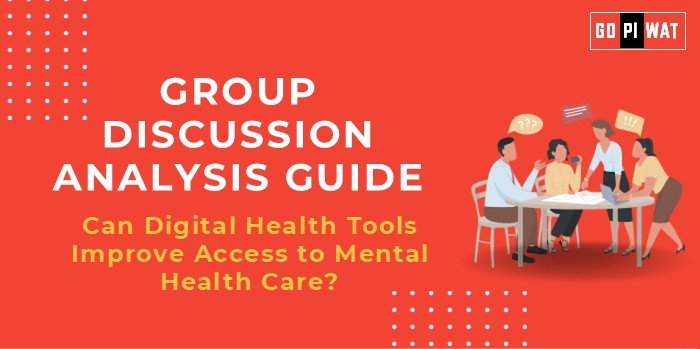📋 Group Discussion Analysis Guide
🌐 Can Digital Health Tools Improve Access to Mental Health Care?
🌟 Introduction to the Topic
Opening Context:
“The integration of digital tools into mental health care offers a transformative opportunity to address longstanding challenges such as access, stigma, and affordability.”
Background:
The rise of telemedicine, mobile applications, and AI-driven tools has opened new avenues for providing mental health services, particularly in underserved regions. The global mental health crisis, amplified by the COVID-19 pandemic, underscores the urgent need for scalable solutions.
📊 Quick Facts and Key Statistics
- 🌍 Mental Health Disorders Prevalence: One in eight people worldwide lives with a mental health disorder (WHO, 2023).
- 📈 Telehealth Usage: 60% of mental health consultations in developed nations occur via telehealth platforms (McKinsey, 2023).
- 💰 Cost Reduction: Digital tools can reduce therapy costs by 40% (Harvard Health, 2023).
- 🌐 Accessibility: 70% of individuals in remote areas can access mental health care through mobile applications (Global Telemedicine Report, 2023).
- 💡 Stigma Reduction: Online platforms increase help-seeking behavior by 25% among youth (APA, 2023).
👥 Stakeholders and Their Roles
- Government Agencies: Policy creation, funding, and infrastructure for digital health services.
- Private Companies: Development of apps, telehealth platforms, and AI-driven tools.
- Healthcare Providers: Adoption and implementation of digital tools to expand service reach.
- Patients and Families: Leveraging digital tools to access affordable and timely care.
- International Organizations: Advocacy and funding for global mental health initiatives.
🎯 Achievements and Challenges
🏆 Achievements
- Increased Accessibility: Telemedicine has reduced geographical barriers, with platforms like BetterHelp connecting patients globally.
- Affordability: AI chatbots like Wysa provide cost-effective emotional support.
- Personalization: Tools like Calm and Headspace offer customized mental wellness programs.
- Stigma Reduction: Digital platforms provide anonymity, encouraging help-seeking.
⚠️ Challenges
- Digital Divide: Limited access to technology in low-income areas.
- Data Privacy: Concerns about patient confidentiality and misuse.
- Reliability: Over-reliance on AI-based tools may miss nuanced human judgment.
🌍 Global Comparisons
- 🇪🇪 Estonia: Successfully integrated digital mental health into public health policies.
- 🇮🇳 India: Faces infrastructure challenges but shows potential for scaling digital health tools.
📖 Structured Arguments for Discussion
- Supporting Stance: “Digital tools democratize mental health care, making it affordable and accessible to underserved populations.”
- Opposing Stance: “The digital divide and privacy concerns undermine the potential of digital health tools.”
- Balanced Perspective: “While promising, digital tools must address systemic gaps like accessibility and data security to maximize their impact.”
💬 Effective Discussion Approaches
Opening Approaches
- “According to the WHO, 1 in 8 people globally suffers from mental health disorders, highlighting the urgent need for scalable solutions like digital tools.”
- “Platforms like Wysa and BetterHelp showcase how technology can overcome traditional barriers in mental health care.”
Counter-Argument Handling
- “While privacy is a concern, advances in encryption and regulations like GDPR offer robust safeguards.”
- “The digital divide can be bridged with initiatives like subsidized internet for low-income communities.”
🛠️ Strategic Analysis of Strengths and Weaknesses
- Strengths: Affordability, accessibility, scalability, stigma reduction.
- Weaknesses: Digital literacy gaps, technological limitations.
- Opportunities: Expansion in emerging markets, AI-driven diagnostics.
- Threats: Mistrust in digital tools, regulatory hurdles.
🎓 Connecting with B-School Applications
Real-World Applications
- Digital health initiatives as case studies for operations and policy management courses.
- Exploring business models in digital mental health platforms.
Sample Interview Questions
- “How can digital tools address the rural-urban divide in mental health care?”
- “Evaluate the role of AI in mental health diagnosis and therapy.”


